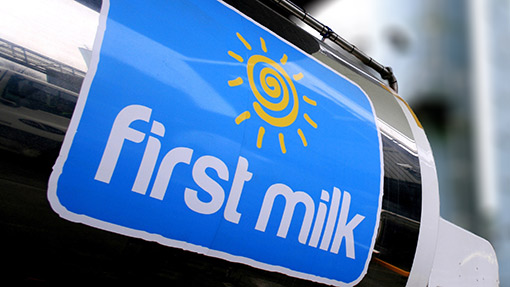First Milk cuts prices by 3p/litre

First Milk has slashed both its milk prices by 3p/litre – the heaviest cut of the year so far.
Co-op members on liquid contracts will be paid 25.1p/litre from October and manufacturing suppliers will receive 26.6p/litre.
The liquid price is now 7.4p/litre lower than in May and the manufacturing contract is down 6.4p/litre.
The processor, which has about 1,800 suppliers, once again blamed the sharp fall in dairy commodity prices around the world, caused by weaker demand from buyers, surging milk production and Russia’s ban on Western food imports.
See also: Dairy Crest cuts both its milk prices by 1.75p/litre
First Milk chairman and former farming minister Sir Jim Paice MP said market returns for the business’ core products had fallen further and faster than the milk price cuts it had issued since June.
“We are well aware of the impact this price cut will have on our members’ cash flow, but this latest move means that we now have our milk prices in line with our projected market returns,” he said.
“Given that most of our milk is manufactured into products like skimmed milk powder, cheese, butter and cream, which are traded globally, we are impacted directly or indirectly by all these market factors.”
Mr Paice said First Milk was maximising the amount of milk going into higher-performing markets, winning listings for added-value brands and cutting costs wherever it can.
But he said these actions would have a limited effect in the face of a falling market.
All of the big four milk processors have cut their prices in the past fortnight: Arla by 1.2p/litre, Muller Wiseman by 1.8p/litre and Dairy Crest by 1.75p/litre.
NFU Scotland (NFUS) issued a statement immediately after First Milk’s announcement, saying it would meet the co-operative as a matter of urgency.
NFUS milk policy manager George Jamieson said it understood that First Milk was particularly exposed to falling prices for skimmed milk powder and commodity cheese.
“First Milk has given NFU Scotland reassurances that it is paying as much as it possibly can without putting the business under pressure, he said.
“First Milk’s cut is deeper because it is more exposed to commodity markets than other processors.
“This is a difficult situation and the co-op and farmer members need to manage this together and, from a wider perspective, the dairy supply chain must address the ongoing threat of volatility.
Mr Jamieson added the co-op must act quickly on the “fundamental weaknesses of the business”.
